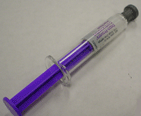 Injectable contraceptives are a rather safe type of birth control they, however, may cause several side-effects which tend to be more obvious than those caused by the use of a birth control pill . The reason for that is a larger dose of hormones than that given by a daily birth control pill. Injectables may cause disappearance of menstruation period for up to one year. Be aware, that statistically only one third of all women using injectable contraceptives have a normal and regular menstrual period during the first year of use. Others tend to experience irregular periods or no menstrual bleeding at all during the first year of use. These side-effects are unfortunately impossible to affect.
Injectable contraceptives are a rather safe type of birth control they, however, may cause several side-effects which tend to be more obvious than those caused by the use of a birth control pill . The reason for that is a larger dose of hormones than that given by a daily birth control pill. Injectables may cause disappearance of menstruation period for up to one year. Be aware, that statistically only one third of all women using injectable contraceptives have a normal and regular menstrual period during the first year of use. Others tend to experience irregular periods or no menstrual bleeding at all during the first year of use. These side-effects are unfortunately impossible to affect.
Another consideration associated with injectables is the loss of bone mass. Injectables have the effect on the calcium stored in bones. The concentration of the calcium in bones decreases especially during the first year of use. The loss of the calcium from bones causes decrease in bone mass. And although the process is reversible and bone mass normally increases after discontinuation of use there are still some long term concerns of a temporary loss of bone mass. Such women are said to have a higher risk for osteoporosis later in their lives.
Other less complicated side-effects include changes in menstrual bleeding, which may become lighter or heavier, shorter or longer. A woman should see her doctor if heavy or continuous bleeding occurs, since it may cause severe anemia. There could also be spotting or breakthrough bleeding. Other side-effects, not associated with menstrual period and bleeding, include dizziness, nervousness, headaches, change in skin color and rash. There might be severe mood swings from very good mood to depression. Women can experience breast tenderness and hair loss. Facial and body hair may increase or decrease. Some women may gain more weight. If any of these side-effects occur a woman should consult a doctor and if these side-effects continue she might even have to choose another method for birth control.
Another side-effect that women may experience with the use of injectable contraceptives is decreased libido. Injectables have been noticed to suppress testosterone and this is believed to be the reason for decreased sex drive in women using this method of birth control.
Although injectable contraceptives provide some protection against endometrial cancer they, however, increase the risk for some other types of cancers in women. These include increased risk for breast and cervical cancer. Therefore women with family history of breast and cervical cancer are recommended to choose another form of birth control. However, final decision should be made only after a thorough consultation with a doctor.
Other possible complications, associated with the use of injectable contraceptives, include blood clots in legs and lungs, jaundice, allergic reaction and even infertility. Therefore women with liver disease, a history of blood clots or stroke should use another method for birth control.
Even though there are no age limitations, progestin-only injectable contraceptives are not to be used by girls younger than sixteen due to the effect of injectables on the bone density and bone mass. Since progestin-only injectable contraceptives may affect fetus, women who plan to become pregnant within the next year should not use this form of birth control. In addition, one should know that women, who get pregnant while being on progestin-only injectables, show to have higher neonatal and infant mortality rates.